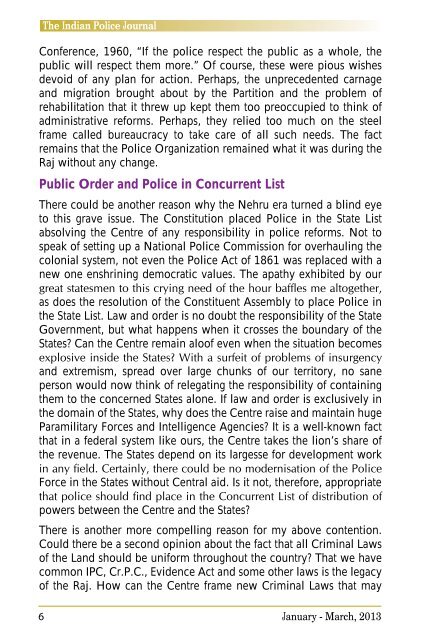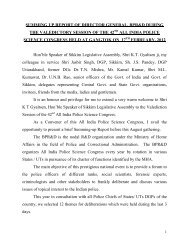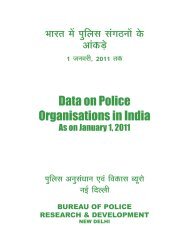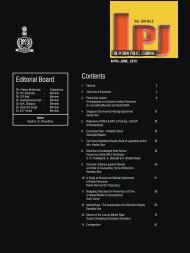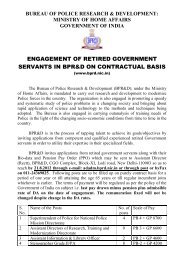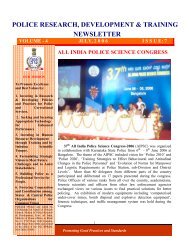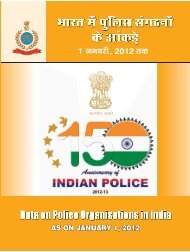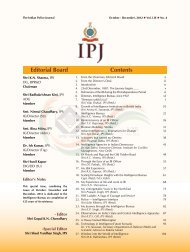by Police - Bureau of Police Research and Development
by Police - Bureau of Police Research and Development
by Police - Bureau of Police Research and Development
You also want an ePaper? Increase the reach of your titles
YUMPU automatically turns print PDFs into web optimized ePapers that Google loves.
The Indian <strong>Police</strong> JournalConference, 1960, “If the police respect the public as a whole, thepublic will respect them more.” Of course, these were pious wishesdevoid <strong>of</strong> any plan for action. Perhaps, the unprecedented carnage<strong>and</strong> migration brought about <strong>by</strong> the Partition <strong>and</strong> the problem <strong>of</strong>rehabilitation that it threw up kept them too preoccupied to think <strong>of</strong>administrative reforms. Perhaps, they relied too much on the steelframe called bureaucracy to take care <strong>of</strong> all such needs. The factremains that the <strong>Police</strong> Organization remained what it was during theRaj without any change.Public Order <strong>and</strong> <strong>Police</strong> in Concurrent ListThere could be another reason why the Nehru era turned a blind eyeto this grave issue. The Constitution placed <strong>Police</strong> in the State Listabsolving the Centre <strong>of</strong> any responsibility in police reforms. Not tospeak <strong>of</strong> setting up a National <strong>Police</strong> Commission for overhauling thecolonial system, not even the <strong>Police</strong> Act <strong>of</strong> 1861 was replaced with anew one enshrining democratic values. The apathy exhibited <strong>by</strong> ouras does the resolution <strong>of</strong> the Constituent Assembly to place <strong>Police</strong> inthe State List. Law <strong>and</strong> order is no doubt the responsibility <strong>of</strong> the StateGovernment, but what happens when it crosses the boundary <strong>of</strong> theStates? Can the Centre remain alo<strong>of</strong> even when the situation becomes<strong>and</strong> extremism, spread over large chunks <strong>of</strong> our territory, no saneperson would now think <strong>of</strong> relegating the responsibility <strong>of</strong> containingthem to the concerned States alone. If law <strong>and</strong> order is exclusively inthe domain <strong>of</strong> the States, why does the Centre raise <strong>and</strong> maintain hugeParamilitary Forces <strong>and</strong> Intelligence Agencies? It is a well-known factthat in a federal system like ours, the Centre takes the lion’s share <strong>of</strong>the revenue. The States depend on its largesse for development workForce in the States without Central aid. Is it not, therefore, appropriatepowers between the Centre <strong>and</strong> the States?There is another more compelling reason for my above contention.Could there be a second opinion about the fact that all Criminal Laws<strong>of</strong> the L<strong>and</strong> should be uniform throughout the country? That we havecommon IPC, Cr.P.C., Evidence Act <strong>and</strong> some other laws is the legacy<strong>of</strong> the Raj. How can the Centre frame new Criminal Laws that may6 January - March, 2013


